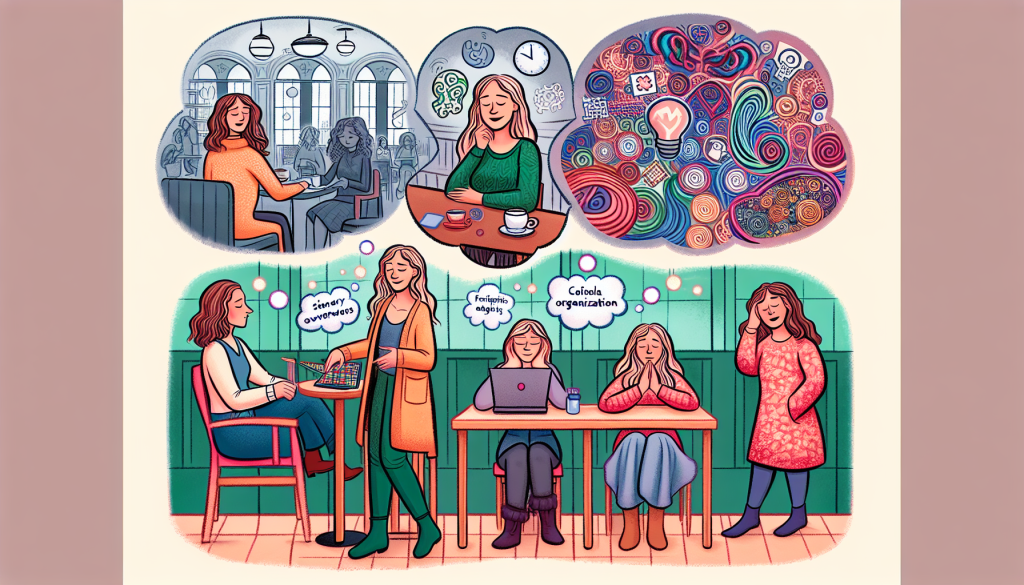ASD women often go undiagnosed due to societal biases and masking behaviors. This article explains the unique signs of autism in women, why these signs are overlooked, and how to get a proper diagnosis and support.
Key Takeaways
- Autism in women is frequently undiagnosed due to historical biases in research, societal expectations, and the masking behaviors they adopt.
- Identifying autism in women requires an understanding of unique presentations such as social communication challenges, sensory sensitivities, and co-occurring mental health conditions.
- Effective support for autistic women includes therapy, medication for co-occurring conditions, and leveraging resources from national organizations to enhance their quality of life.
Why Autism in Women Often Goes Unnoticed

Autism in women frequently remains undetected due to biases in autism research, the masking behaviors women adopt, and societal expectations. Systemic discrimination and lack of gender diversity in autism research create significant challenges for women seeking a diagnosis.
Socialization processes often cause women to mask their symptoms, making timely diagnosis difficult. The diagnostic and statistical manual criteria historically focused on male presentations, complicating accurate diagnosis in women.
Historical Bias in Autism Research
Autism research has historically favored males, leading to diagnostic criteria that may overlook female presentations. Autism diagnosis can be biased, often emphasizing behaviors more prevalent in boys. Boys are referred for diagnosis ten times more than girls, leaving many undiagnosed females feeling something is wrong with them for years.
Many physicians lack a strong understanding of autism in females, primarily due to assessment tools based on male traits.
Masking and Camouflaging Behaviors
Masking in autistic girls involves hiding autistic traits. Diagnosing autism in girls is challenging because they often display socially acceptable behaviors and mask their symptoms. Young autistic females are typically more motivated to fit in socially compared to males.
Autistic females may learn socially acceptable behavior by mimicking what they observe in media and interactions. To blend in, autistic females often mimic social behaviors, complicating their diagnostic process.
Societal Expectations
Societal norms often lead to the misinterpretation of autistic behaviors in women. Social communication challenges in autistic women are often mistaken for other difficulties or personality traits, complicating diagnosis. The pressure to conform to societal expectations can cause significant stress and anxiety for autistic women.
Recognizing Signs of Autism in Women

Recognizing autism spectrum disorder in women requires understanding its unique manifestations. Key traits in women include difficulties with speech and social communication. Sensory sensitivities and repetitive behaviors are also significant characteristics.
The presentation of autism symptoms in women often differs from men, complicating diagnosis. Lower cognitive ability and adaptive functions may be more common in autistic females compared to males.
Social Communication Challenges
Communication differences in autistic women include variations in speech, body language, and social communication challenges. Many autistic females experience more severe social and communication difficulties during adolescence and adulthood. Autistic individuals often face difficulties connecting with others, hindering social interactions.
These women may struggle with eye contact in social situations but often force themselves. Social anxiety commonly complicates interactions for many autistic women.
Sensory Sensitivities
Heightened sensitivity to smell, light, sound, or touch is common in autistic women.
Sensitivity to loud noises and bright lights is common for autistic women.
Overstimulating sensory stimuli include:
- sounds
- pain
- temperature
- textures
- light
- movement
Sensory sensitivities may force autistic women to avoid triggers, impacting daily activities.
Repetitive Behaviors and Special Interests
Repetitive behaviors in autistic women often appear as specific rituals or routines that provide comfort. Stimming behaviors in women may include subtle actions like fidgeting or adjusting clothing.
Autistic females may pursue a narrower range of special interests, often focusing intensely on specific topics related to the female autism phenotype.
Diagnosing Autism in Adult Females
Diagnosing autism in adult females is challenging due to gender stereotypes and social stigma. Symptoms may be difficult to identify due to cultural expectations, leading to under-diagnosis in females. Women on the autism spectrum may appear shy or passive, complicating diagnosis.
Autistic women may develop coping mechanisms that mask symptoms, making diagnosis difficult.
Diagnostic Criteria and Tools
Autism research has historically focused on autistic males, creating diagnostic criteria that reflect the realities of autistic boys and men. Many diagnostic tools are based on male traits, complicating identification and possibly overlooking symptoms in females.
Improving identification of autism in women requires adapting diagnostic criteria and developing tools that account for its unique presentation in females.
Importance of Developmental History
Developmental history, which includes early behavioral patterns, is often overlooked in adult women. Communication difficulties can mask mental health issues like depression in autistic females. Understanding early patterns is crucial for accurate diagnosis and support.
Seeking Multiple Opinions
Traits of autism can appear differently in women compared to men. Different professional assessments are crucial to address the varying manifestations of autism in women.
Multiple opinions ensure a more comprehensive understanding and accurate diagnosis.
Co-occurring Conditions in Autistic Women

Co-occurring conditions often lead to more complex needs in diagnosis and treatment for autistic women. Mental exhaustion, stress, and anxiety are common among autistic women who mask their traits.
Co-occurring conditions can significantly impact quality of life and require specialized attention.
Mental Health Conditions
Autistic women commonly experience mental health conditions like anxiety and eating disorders. Obsessive-compulsive disorder is also prevalent among them. Autistic women tend to experience mood issues, especially anxiety and depression, more frequently than men, including various mental disorders.
Mental health counseling is recommended for co-occurring conditions in autistic women.
Eating Disorders
Autistic women may develop food intake disorders unrelated to concerns about weight or body image. Restrictive eating patterns in autistic females can lead to misdiagnoses like anorexia nervosa.
These eating disorders require specialized treatment.
Autistic Burnout
Autistic burnout involves chronic exhaustion leading to skill loss and lower sensory tolerance. Understimulation can cause discomfort and frustration in autistic women.
Autistic burnout can lead to significant skill loss and decreased sensory tolerance, impacting daily functioning.
Support and Treatment Options

Therapy, support programs, and health insurance coverage can positively impact autistic people. Autistic women frequently face heightened anxiety and depression due to social isolation and emotional dysregulation.
Socializing on one’s own terms and recognizing personal limits can enhance self-care for autistic individuals.
Therapy and Counseling
Talk therapy, social skills coaching, sensory integration therapy, and support groups are common approaches for autistic adults. Occupational therapy can help autistic women develop daily living skills.
Specialized therapy for autistic women often uses visual tools to aid understanding of emotions and situations.
Medication
Common co-occurring mental health conditions in autistic women include anxiety and depression. These co-occurring conditions often necessitate medication management to improve overall well-being.
Medication can help manage anxiety disorders with options like SSRIs and benzodiazepines.
Support Networks and Resources
National organizations provide resources and advocacy for women on the autism spectrum. Organizations like the National Autistic Society offer resources for autistic individuals and their families. Primary health providers can connect individuals who suspect they have autism with specialists and resources.
Living Well with Autism

Support is crucial for enhancing the lives of autistic individuals. Social skills coaching helps autistic adults improve interactions and relationships. Specialist therapists are adept at addressing the unique social and communication barriers faced by autistic clients.
Support groups offer shared experiences and coping strategies for autistic women.
Self-Care Strategies
Daily calming practices like yoga can help autistic individuals manage stress and prevent sensory overwhelm. Keeping calming items like fidget tools or cold water can help manage anxiety during stressful interactions.
Grounding techniques, such as focusing on sensory experiences, can help manage overwhelming situations.
Building Social Relationships
Many autistic individuals prefer smaller, intimate social settings over larger gatherings. Meaningful social relationships are crucial for mental well-being and fulfillment among autistic women.
Engaging in social activities that align with personal interests can help autistic women feel more comfortable in social situations.
Pursuing Interests and Hobbies
Engaging in special interests can provide autistic women with joy, fulfillment, and a sense of purpose. Pursuing hobbies can serve as a productive way to manage stress and promote mental well-being.
Summary
Understanding autism in women requires recognizing the unique ways it manifests, the impact of societal expectations, and the importance of accurate diagnosis and tailored support. By acknowledging the challenges and providing appropriate support, we can help autistic women lead fulfilling lives.
Frequently Asked Questions
Why is autism often underdiagnosed in women?** **?
Autism is frequently underdiagnosed in women due to biases in research that emphasize male behaviors, societal pressures for women to mask their traits, and diagnostic criteria that inadequately reflect the female autism phenotype. This results in many women not receiving the appropriate diagnosis and support they require.
What are some common signs of autism in women?** **?
Common signs of autism in women encompass challenges in social communication, increased sensory sensitivities, and repetitive behaviors or intense special interests. These manifestations may vary from those typically seen in men, complicating the identification process.
How can autistic women get an accurate diagnosis?** **?
Autistic women can achieve an accurate diagnosis by consulting multiple professionals and ensuring their developmental history and unique traits are properly assessed. Utilizing diagnostic tools specifically designed for female autism is also essential.
What co-occurring conditions are common in autistic women?** **?
Common co-occurring conditions in autistic women include anxiety, depression, eating disorders, and autistic burnout. These challenges necessitate specialized care for effective management.
What support options are available for autistic women?** **?
Support options for autistic women include therapy and counseling, medication for co-occurring conditions, and access to support networks such as the National Autistic Society. Additionally, engaging in self-care, building social relationships, and pursuing interests can greatly enhance their well-being.
